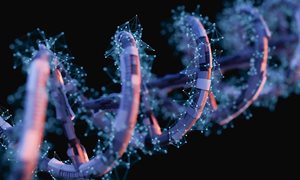3 September 2018
Researchers from Radboudumc and Eindhoven University of Technology developed a high-throughput nano lab to shed light on this process. Last week, their findings were published in Nature Communications.
Using their device, the researchers around Florian Wimmers (Radboudumc, Stanford University) tested thousands of single pDCs for their ability to produce type I IFN. Remarkably, they discovered that only a tiny subset of single pDCs produces type I IFN. When these cells were mixed with other pDCs, crosstalk between individual cells within the population led to a boost in activity. The results of the team around Wimmers that was supervised by Jurjen Tel (TUE) and Jolanda de Vries (Radboudumc) will help to design better cancer treatments. Interventions that target pDCs inside the body should consider that not all pDCs are the same and that the local density of pDCs is an important indicator of their activity.The nano lab that the team used for this analysis was developed in collaboration with Wilhelm Huck (Radboud University) and Carl Figdor (Radboudumc). The device generates millions of tiny droplets, each containing a single cell. Researchers study the behavior of the captured cells at high-throughput to better understand cell-cell variability and the fundamental rules of cellular communication.
 Dendritic cells (DCs) are a rare type of immune cells that scan the body for infectious invaders and cancers. Once identified, DCs train the immune system to destroy these attackers; keeping us healthy. Because of these skills, DCs are currently in the focus of anti-cancer vaccine research.
Dendritic cells (DCs) are a rare type of immune cells that scan the body for infectious invaders and cancers. Once identified, DCs train the immune system to destroy these attackers; keeping us healthy. Because of these skills, DCs are currently in the focus of anti-cancer vaccine research.
Researchers from Radboudumc and Eindhoven University of Technology developed a high-throughput nano lab to shed light on this process. Last week, their findings were published in Nature Communications.
Using their device, the researchers around Florian Wimmers (Radboudumc, Stanford University) tested thousands of single pDCs for their ability to produce type I IFN. Remarkably, they discovered that only a tiny subset of single pDCs produces type I IFN. When these cells were mixed with other pDCs, crosstalk between individual cells within the population led to a boost in activity. The results of the team around Wimmers that was supervised by Jurjen Tel (TUE) and Jolanda de Vries (Radboudumc) will help to design better cancer treatments. Interventions that target pDCs inside the body should consider that not all pDCs are the same and that the local density of pDCs is an important indicator of their activity.The nano lab that the team used for this analysis was developed in collaboration with Wilhelm Huck (Radboud University) and Carl Figdor (Radboudumc). The device generates millions of tiny droplets, each containing a single cell. Researchers study the behavior of the captured cells at high-throughput to better understand cell-cell variability and the fundamental rules of cellular communication.
Related news items

Rubicon grants awarded to three RIMLS researchers
19 April 2022Three researchers have received Rubicon funding from NWO/ZonMw. This will enable Elke Muntjewerff, Laura de Vries and Laurens van de Wiel to do research at a foreign research institute for the next two years.
go to page
ERC Proof of Concept Grant for Martijn Verdoes
8 March 2022 Martijn Verdoes, group leader Chemical Immunology at the department of Tumor Immunology, has been awarded an ERC Proof of Concept (PoC) Grant. The ERC PoC Grants are designed to support ERC grantees with the commercial or societal application of the results of their funded research. go to page
New genetic defect links cell biology and protein glycosylation
10 November 2021 Peter Linders, Dirk Lefeber and Geert van den Bogaart together with international colleagues have recently reported on novel cell biological insights, by identifying a genetic disorder in syntaxin-5 which allowed to unravel a new mechanism regulating intracellular transportation. go to page
RIMLS awards call for nominations
19 October 2021 RIMLS awards several prizes to stimulate and honor our (young) researchers. Upcoming awards are Supervisor of the Year, Best Master Thesis, Best Publication, Best Image and more. Send your nominations now before 24 November 2021. go to page
Three VIDI grants for RIMLS researchers
24 May 2019 Matthijs Jore, Daniele Tauriello and Johannes Textor are each to receive up to 800,000 euros to develop an innovative research theme and to build up their own research group. NWO is awarding the Vidi grant as part of the Innovational Research Incentives Scheme. go to page
